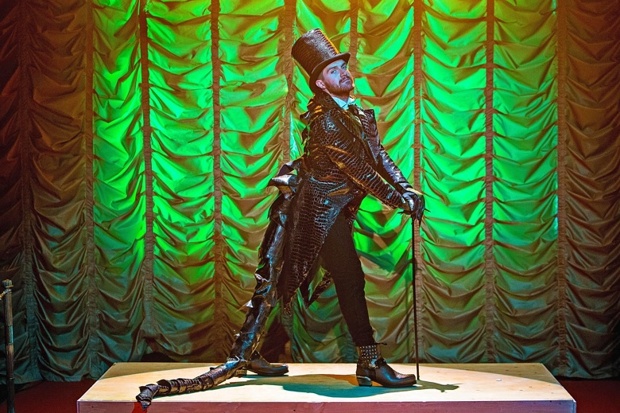The Crocodile, Pavilion Theatre, Manchester
reviewed for The Times, 16 July 2015
Jonah lived in a whale, Ivan Matveitch lived in a crocodile. Like Jonah, Ivan has a sermon of social corruption to preach, but he’d also quite like to get on with his song-and-dance career.
The crocodile, however, is a major capital asset to the zoo, and our Ivan can’t afford the cost of extracting himself. So for now he’s singing for pennies in the crocodile’s belly. Thus the sitcom writer Tom Basden turns Dostoevsky’s allegory of capitalist inhumanity into a sharp satire on political celebrity in the Twitter age.
Ciarán Owens is by turns absurd, charming and subtly sinister as the idealistic but vain young socialist Ivan, whose career is tanking until the crocodile makes him a star attraction. Where he might veer too crudely into pomposity, he’s punctured by Simon Bird as the straight man, Zack.
Bird doesn’t venture too far from his shtick as the hapless hero of The Inbetweeners and Friday Night Dinner, desperately trying to stay between the lines of society’s confusing colouring-in book while his rule-breaking friends steal all the prizes. Yet his comic timing works as successfully on stage as on screen.
And while Basden’s moral of political life — first they love you, then they hate you, then you sell out and build a career in light entertainment — is familiar, it’s given verve by the director, Ned Bennett, and the Invisible Dot company’s trademark cabaret style.
Newcomer Emma Sidi is amply capable as Anya, the girlfriend, on and off, of both men, but there’s something cloying in Basden’s vision of the only woman on stage. She might be less coquettishly selfish than Dostoevsky’s unreconstructed sketch of capitalist womanhood, penned a century and a half ago, but only just. “She was a perfect sugar plum, and that was all one could say of her,” our Russian narrator tells us, and Sidi doesn’t seem far off.
Basden is better on the hypocrisies of young idealists — “have you ever actually met a serf?” — than when giving them free rein. Ivan’s original pronouncements on bringing down global capitalism have an air of delicious self-indulgence: “The Tsar hasn’t freed the serfs. He’s just released them into the menace of the free market.” Yet by the end he has the audience eating out of his hand, with an extended fable about the contagious horrors of money that is as simplistic as it is beguiling. There’s little of Dostoevsky’s desperate self-loathing, but it is perhaps more enjoyable for it.







